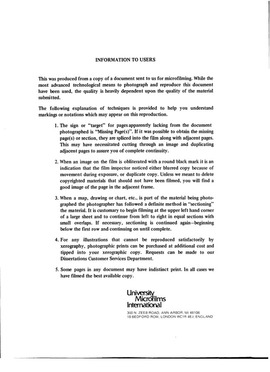| dc.contributor.author | Kuchta, Frank Howard, | en_US |
| dc.date.accessioned | 2013-08-16T12:28:13Z | |
| dc.date.available | 2013-08-16T12:28:13Z | |
| dc.date.issued | 1980 | en_US |
| dc.identifier.uri | https://hdl.handle.net/11244/4772 | |
| dc.description.abstract | Public school students and their reading teachers were the subjects used in the study. Gates-MacGinitie Reading test scores were used to measure student achievement gains and the Tuckman Teacher Feedback Form was used to quantify teacher humanistic behavior or characteristics on four dimensions: Creativity; Dynamism (dominance and energy); Organized Demeanor (organization and control); and Warmth and Acceptance. Hypotheses were tested in the null form at the .05 level for z-score analyses of large group mean differences and at the .05 point for t test values for small group mean analyses. Analysis was made for achievement gain means for students of teachers with high humanistic scores versus students of teachers with low humanistic scores. | en_US |
| dc.description.abstract | The findings support in general the rejection of the null hypotheses. Students of teachers scoring high in humanistic behavior or qualities tended to have higher mean achievement gains. Also, teachers age or level of teaching experience made no significant difference in ideal humanistic behavior scores. Two of the four TTFF humanistic dimensions showed significant differences between teachers ideal humanistic scores and scores obtained from peer observation of the teachers. | en_US |
| dc.description.abstract | It was found that in most tests of significance for comprehension reading achievement gains along all four dimensions of the TTFF, there were significant differences between student gains. The higher humanistic teachers had students with higher achievement gains. One humanistic dimension, Dynamism, tended to be either not significant or inversely significant to other dimensions indicating the possibility that outgoing, aggressive, dominant teachers may detract from the teacher-student relationship and result in lower achievement gains. | en_US |
| dc.description.abstract | The problem considered in this study was to determine if student achievement gains were affected by the humanistic behavior or qualities of teachers. Related problems dealt with differences in ideal humanistic behavior of teachers based upon age and experience. Differences between observed humanistic scores for teachers versus ideal humanistic scores were also analyzed. | en_US |
| dc.format.extent | vii, 86 leaves ; | en_US |
| dc.subject | Education, Administration. | en_US |
| dc.title | A study to determine the effect of teachers' humanistic behavior on students' learning behavior. | en_US |
| dc.type | Thesis | en_US |
| dc.thesis.degree | Educat.D. | en_US |
| dc.thesis.degreeDiscipline | Jeannine Rainbolt College of Education | en_US |
| dc.note | Source: Dissertation Abstracts International, Volume: 41-06, Section: A, page: 2382. | en_US |
| ou.identifier | (UMI)AAI8027520 | en_US |
| ou.group | Jeannine Rainbolt College of Education | |
